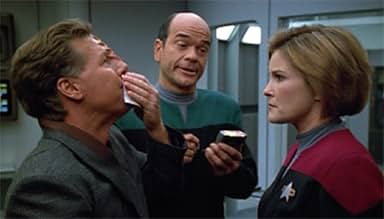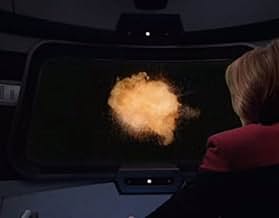Retrospect
- Episode aired Feb 25, 1998
- TV-PG
- 45m
IMDb RATING
6.5/10
2.1K
YOUR RATING
Seven of Nine claims to have been assaulted by the arms trader who just sold new technology to Voyager.Seven of Nine claims to have been assaulted by the arms trader who just sold new technology to Voyager.Seven of Nine claims to have been assaulted by the arms trader who just sold new technology to Voyager.
Ethan Phillips
- Neelix
- (credit only)
Patrick Barnitt
- Entharan Assistant
- (uncredited)
Tarik Ergin
- Lt. Ayala
- (uncredited)
Sylvester Foster
- Crewman Timothy Lang
- (uncredited)
Peter Scott Harmyk
- Crewman Thompson
- (uncredited)
Scott Pierce
- Entharan Test Subject
- (uncredited)
Christina Rydell
- Command Division Ensign
- (uncredited)
Featured reviews
This is one of my least favourite episodes of Voyager, almost as bad as The Thaw. The fundamental problem with the episode is that at no point does it make it clear to the viewer that Seven's memories are false. In the episode the case against Seven's story grows increasingly stronger but all of a sudden everyone changes their minds with no explanations at all for where Seven's memories came from or why she had them.
As much as I may agree with the fundamental premise, that the testimony of abused people should not always be taken at face value, the episode would have done much more to serve this view if it had offered up an alternative explanation to Seven's memories, something they instead gloss over.
As much as I may agree with the fundamental premise, that the testimony of abused people should not always be taken at face value, the episode would have done much more to serve this view if it had offered up an alternative explanation to Seven's memories, something they instead gloss over.
Janeway should have thrown in a crate of self sealing stem bolts or perhaps Neelix' supply of Yamok sauce. Lol
Did any female writers even have a voice when this was written? Shameful.
...and try to examine this episode in terms of complexity.
While I understand the furor over the treatment of the (metaphorical) rape victim and the indications that it was an (unintentionally) false accusation, one of the most fascinating aspects of the evolution of Star Trek over its various incarnation and series is the way the underlying themes and plots grow both heavier and more complex. TOS was...well, it wasn't exactly the most profound and deep of series. It was groundbreaking, but still a product of its times, when there was far less freedom on TV to explore the more troubling aspects of the world. TNG gradually evolved from less-than-inspiring early seasons to become far more complex and insightful than TOS ever was (and that includes most of the early movies, Wrath excepted.) With DS9, they started pushing the envelope almost immediately, bringing in issues of society and religion, war crimes. slavery, genocide, terrorism, and...oh, all the usual things you'd expect from a station located on the precipice of continuous warfare. Voyager has continued the tradition of exploring issue in more depth, if unevenly so in the first 3 seasons. And then we have this episode...
The attempts from certain portions of society to minimize the suffering of rape, especially by blaming the victim or overreacting to anecdotes of false accusations make this episode a fraught one indeed. Despite saying, and believing, that the outcome here is a dangerous one, I actually think that the writers managed to make an intelligent choice. In TOS or at least 2/3rds of the run of TNG, the episode would have ended with the accused proven guilty, the accuser vindicated, and the world returned to its balance. It feels good, it feels right (unless you are one of those angry men who can't handle the fact that rape is a serious problem in this world and among our species) and nobody would have complained (except aforementioned men.)
But....the world, and the galaxy, apparently, is not a simple feel-good place. Humans are complex creatures. Due to her nature, Seven of Nine is more complex than most. She's dealing with a horrific past, a confusing present, and a future that promises to make dealing with her past even more horrific. And that's exactly what this episode is really about. Not the metaphorical rape that appeared to occur in this episode, but by the metaphorical *life-destroying* rape that absolutely did happen when she was a small child. It's not about a false accusation of rape, it's about a true accusation of rape. As she becomes more human, she has become more cognizant of the horror done to her. Just a few episodes ago, she considered being assimilated, and her life afterwards, to be the best thing that ever happened to her. But no human that thinks like a human would take that perspective. She's starting to think like a human, feel like a human, and that includes being appalled and angry at what was done to her, like any rape victim should and would.
This was a troubling episode, no question, with an apparently troubling moral. Beneath that apparent moral, I think, is a far more complex and meaningful one, though.
While I understand the furor over the treatment of the (metaphorical) rape victim and the indications that it was an (unintentionally) false accusation, one of the most fascinating aspects of the evolution of Star Trek over its various incarnation and series is the way the underlying themes and plots grow both heavier and more complex. TOS was...well, it wasn't exactly the most profound and deep of series. It was groundbreaking, but still a product of its times, when there was far less freedom on TV to explore the more troubling aspects of the world. TNG gradually evolved from less-than-inspiring early seasons to become far more complex and insightful than TOS ever was (and that includes most of the early movies, Wrath excepted.) With DS9, they started pushing the envelope almost immediately, bringing in issues of society and religion, war crimes. slavery, genocide, terrorism, and...oh, all the usual things you'd expect from a station located on the precipice of continuous warfare. Voyager has continued the tradition of exploring issue in more depth, if unevenly so in the first 3 seasons. And then we have this episode...
The attempts from certain portions of society to minimize the suffering of rape, especially by blaming the victim or overreacting to anecdotes of false accusations make this episode a fraught one indeed. Despite saying, and believing, that the outcome here is a dangerous one, I actually think that the writers managed to make an intelligent choice. In TOS or at least 2/3rds of the run of TNG, the episode would have ended with the accused proven guilty, the accuser vindicated, and the world returned to its balance. It feels good, it feels right (unless you are one of those angry men who can't handle the fact that rape is a serious problem in this world and among our species) and nobody would have complained (except aforementioned men.)
But....the world, and the galaxy, apparently, is not a simple feel-good place. Humans are complex creatures. Due to her nature, Seven of Nine is more complex than most. She's dealing with a horrific past, a confusing present, and a future that promises to make dealing with her past even more horrific. And that's exactly what this episode is really about. Not the metaphorical rape that appeared to occur in this episode, but by the metaphorical *life-destroying* rape that absolutely did happen when she was a small child. It's not about a false accusation of rape, it's about a true accusation of rape. As she becomes more human, she has become more cognizant of the horror done to her. Just a few episodes ago, she considered being assimilated, and her life afterwards, to be the best thing that ever happened to her. But no human that thinks like a human would take that perspective. She's starting to think like a human, feel like a human, and that includes being appalled and angry at what was done to her, like any rape victim should and would.
This was a troubling episode, no question, with an apparently troubling moral. Beneath that apparent moral, I think, is a far more complex and meaningful one, though.
I can be noted that this episode was not written by the same writer as the last. I have noticed some reviews coming from anti-male writers. The episode is indeed balanced and does represent some real life situations. People react in the way in which people do in real life.
I would say the whole point of the episode is examining the notion of questioning emotion over logic. People with "witch-hunt" types of mentality ( always guilty regardless of whether they can be proved innocent) won't like it. The reason for this is because the episode reflects real life.
Unlike the last episode people stay in character this time. 7 of 9 (contrary to some people) IS taken seriously and people do seem to jump to conclusions probably because she is one of their own.
In no way does the episode suggest that a woman's rights are less than male's... none whatsoever. It is purely reflecting on the need to use sound judgement and seek the truth in an objective manner. There are plenty of times when perpetrators of some form of violation are truely guilty; some of those people get away with it and some don't. There are also several incidents where innocent people get wrongly convicted or have their life destroyed because of false allegations. It is just life.
I would say the whole point of the episode is examining the notion of questioning emotion over logic. People with "witch-hunt" types of mentality ( always guilty regardless of whether they can be proved innocent) won't like it. The reason for this is because the episode reflects real life.
Unlike the last episode people stay in character this time. 7 of 9 (contrary to some people) IS taken seriously and people do seem to jump to conclusions probably because she is one of their own.
In no way does the episode suggest that a woman's rights are less than male's... none whatsoever. It is purely reflecting on the need to use sound judgement and seek the truth in an objective manner. There are plenty of times when perpetrators of some form of violation are truely guilty; some of those people get away with it and some don't. There are also several incidents where innocent people get wrongly convicted or have their life destroyed because of false allegations. It is just life.
Did you know
- TriviaThe interior cockpit of Kovin's ship was a reuse of the cockpit from the Timeship Aeon, which appears in Future's End (1996)/Future's End: Part II (1996).
- GoofsWhen Kovin said they reported the accident immediately, Captain Janeway doesn't look at the accident report nor do they attempt to have Seven identify the other assistant in the lab where she was "held."
- Quotes
The Doctor: I often find my own patience being tested by someone like Mr. Kovin. Of course I generally respond with a devastating quip rather than a left hook.
- ConnectionsReferenced in Treksperts Briefing Room: Retrospect w/ Bryan Fuller (2021)
Details
- Release date
- Country of origin
- Official site
- Languages
- Filming locations
- Production company
- See more company credits at IMDbPro
- Runtime
- 45m
- Color
- Sound mix
- Aspect ratio
- 1.33 : 1
- 4:3
Contribute to this page
Suggest an edit or add missing content

























